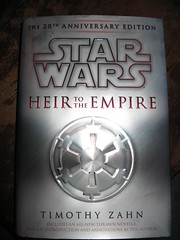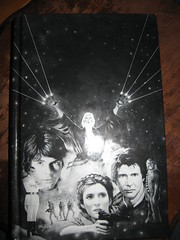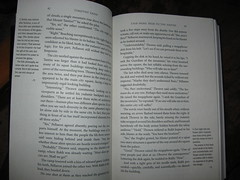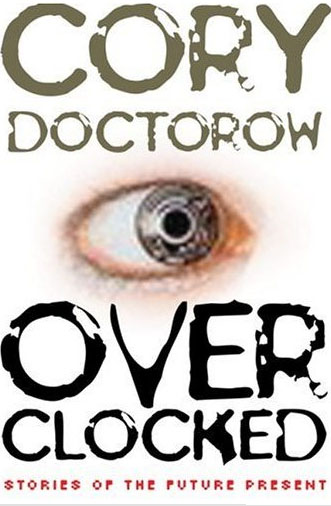I'm currently reading Fellowship of the Ring (technically, re-reading the first 11 chapters since I tried reading the book before), and it's got me thinking about the movie adaptations of the Lord of the Rings franchise, and movie adaptations of books in general. So I present to you a series of three posts about this very subject.
I don't know that I can say I've "always felt this way" about the relationship between film and books, but I've felt this way about it for a long enough time: they're different beasts. Yeah, I'm sure this is a newsflash for everyone out there. The weird thing - and this just occurred to me - is that while they are two different forms of media, they are both presented in a similar manner.
I bring this up because that's usually the go-to argument about the differences between film and print; film is a visual medium, they say, while print is not. Wait a second - I understand what point you're trying to convey, but how is reading a book not visual stimuli? You use your eyes to read the words, and that activates your imagination. I guess it would be better to say that books are an intellectual medium - but then, so too can film be intellectual (see:
Tree of Life*).
To get to my point faster, here's the question: if books and movies can both be considered to be engaging the same stimuli - albeit in different ways - how come movie adaptations of books are often major departures from the original source? Unfortunately the answer is a little complicated, so uh...I hope you have some time set aside to do a little bit of reading. The first difference is obvious - how we physically consume the media; second, the physical limitations of either media; and lastly, the difference is that they're the same. What? Yes, they are the same. Bear with me - in three weeks, you will understand what I'm talking about.
I thought I would start out with the most obvious, which is how we physically consume either media. To drill down a bit further, it comes down to how much time we spend with each form of story-telling. When reading a book, we have the leisure to read whenever we want, and virtually whereever we want.** Some people read at
blinding speeds, while others take their time and read when they can.*** Unless you've borrowed the book from the library, it's there, ready for your eyes, whenever you wish.
Conversely, movies have an average running time of anywhere from 1 and a half hours to 2 and a half hours (with the epic movies, like
Lord of the Rings, stretching past the three hour mark). One could argue that outside of the theatre we have the same luxury as we do with books in that we can watch at our leisure, pause and start as we please; the truth is that films are made to make money in theatres****, not at home or on the bus to work.
Because of the time constraint, writers and producers often have to cut extraneous portions of the source material in order to present it on-screen in a reasonable running time. This is especially true with large tomes (there's a reason why
A Game of Thrones went to TV, not theatres). As a result, what we see on screen is usually not a 100% true adaptation of the book. And, in what's going to be a common theme in this essay, that's OK, because filmmakers are trying to make a film - just because they don't have an original idea doesn't change anything.
Dealing with a time constraint is the primary reason why die-hard franchise fans are often disappointed in on-screen adaptations of their most beloved stories. What they really need to do is critique the movies as
films, not as
adaptations. Yes, the strength of the story depends largely on the original source, but it's my opinion that you can't objectively say, "This movie was bad because it didn't contain
X element that was present in the original book." Usually there's a reason it was omitted from the screen adaptation. What you should evaluate is what you see on screen, and how everything fits together.
Next week, we'll explore the physical differences of each media. And after that, I'll explain why neither of the first two essays matter because both formats are the same.
* - To be fair, I don't actually know anything about
Tree of Life except that the critics over at Filmspotting had a field day with this one, and it all went way over my head. So I think it's safe to say that this film generated intense intellectual debate.
** - I'll thank you to
not read while you drive.
*** - I certainly don't take several months to read a book. *cough*
**** - That's why they report box office gross, not weekly DVD sales. Of course this doesn't apply if your studio releases movies direct-to-DVD.




